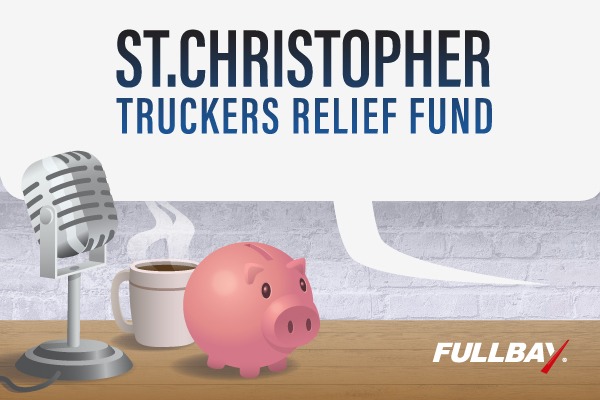How St. Christopher Truckers Relief Fund Helps Drivers

There are over 3.5 million professional truck drivers criss-crossing the United States every day. They’re bringing us food, clothing, medicine, building supplies – you name it, it probably spent time on a truck.
Those drivers spend long days (and sometimes nights) behind the wheel. Like anyone else, they can get sick, hurt themselves, or need to take time off to look after their families. Like anyone else, they sometimes need a little extra help to do that.
That’s where St. Christopher Truckers Relief Fund (SCF) comes in. Since 2008, this wonderful nonprofit has stepped in when truck drivers need a hand, whether they need help with their mortgages or other necessary household expenses.
SCF’s desire to help drivers inspired us. Here at Fullbay, we’re always looking for new ways to help the industry; often, that boils down to making donations and spreading the word. That’s why, for every signup we receive in October, we’ll make a donation to them through our Fullbay Cares initiative.
We sat down with Shannon Currier, the Director of Philanthropy & Development at SCF, to learn more about the organization and its mission.
THE BEGINNING
Like many origin stories, SCF began with someone realizing people needed help. Dave Nemo (of “The Dave Nemo Show” fame), Michael Burns, and Dr. John McElligott had met hundreds of truck drivers who met with hardship due to short-term injury or illness, which often drove them off the road. After they recovered, they often lost their trucks and their livelihoods.
Many companies do have programs for drivers who need help, but often there are so many drivers to look after that it’s easy for some to slip through the cracks. That’s where these three men saw a place to help. They decided to start a nonprofit that could step in and help over-the-road and regional drivers when they had short-term injury or illness. SCF gained its nonprofit status in 2007 and helped its first driver in 2008.
When it came to naming their nonprofit, St. Christopher was a natural choice. He’s the patron saint of travelers, and you may have seen his medallions hanging in the cars and trucks of those who travel frequently.
“Historically, St. Christopher has been known in the industry for a long time,” Shannon says, “and it was a name [truck drivers] would associate with safety and travel and taking care of people on the road.”
They’ve lived up to the spirit of the name. One driver needed a hearing aid so he could continue to drive; SCF made sure he got one. Others have had to step away from their jobs so they could obtain cancer treatments, or be there for a sick loved one. St. Christopher Fund has made that possible.
Despite the name, SCF is not religiously affiliated, nor does any driver need to be of a particular religion to ask for help. Just like St. Christopher, they are here for everyone.
HOW THEY HELP
When they first started out, SCF helped drivers directly, handing them funds as necessary. But as the need grew, so did the way they dispersed the help. Today, SFC does not pay anything to drivers. Instead, they get in touch with the billholder and pay that entity.
First, let’s outline what SFC can assist with. When a driver is laid up or out of work, the charity aims to take care of necessary bills – things that can’t be deferred:
- Rent or mortgage
- Utility bills
- Vehicle or truck payments
- Insurance
If a truck driver finds themself needing financial help, they can either fill out an application on the website or request that one be faxed or mailed to them. The driver needs to fill out their personal info, provide a copy of their CDL, employment verification, a description of their illness/injury, as well as describe their household and financial situation.
The records are reviewed by SCF’s medical director. Generally, the driver and their family are informed that they’ve been approved for a set amount of money, which can be used for one of the necessary bills we listed above. The driver then has to send the bills to SCF as they arrive.
Drivers must also sign a medical release form, which allows SCF to obtain medical records. “Sometimes [the driver] is in the hospital” when the application is sent, Shannon remarks, and signing a release form allows the driver to focus on getting well instead of scrambling around for records.
THE QUESTION OF COVID-19
Nearly all of the charities we’ve spoken to this year have been impacted by COVID-19. Shannon admits that SCF did initially worry a bit; they had come into 2020 a bit behind on their fundraising, and knew they needed to catch up. They particularly feared a sudden influx of applications from sick drivers. How would they keep up?
Their mission remained the same: They had to protect and assist drivers. With that in mind, SCF took a proactive approach. They reached out to existing corporate sponsors, asking them to give a little earlier this year so they could shore up finances in case of a COVID-19-relate surge in applications.
People responded. Better yet, they spread the word.
“Companies within the industry started looking for ways to give back to drivers, and support drivers,” Shannon recalls. These companies knew truck drivers would not be staying home, even though the rest of us were on lockdown or close to it. Word spread, and support poured in from multiple new directions.
“We have seen some applications from COVID, and we’ve been able to help them,” Shannon says, “but not as many as we thought.” She recollects a husband-wife driving team that had to come off the road due to COVID-19 – thanks to SCF’s help, they were able to take the time needed to recover and get back on the road.
“There’s not ever enough,” Shannon cautions. “We run close to budget. But it gave us some breathing room.”
HEALTH & WELLNESS
As SCF looked over applications and medical records, they noticed a common theme: Many drivers suffered from cardiovascular issues like heart attacks or high blood pressure. Much of this is due to the sedentary lifestyle they lead; long hours spent seated driving, stopping at places that often have, well, less than healthy food.
SCF saw another area where they could help. They developed a Health & Wellness initiative, which helps drivers with things like:
- Choosing better food on the road
- Drinking water instead of soda
- How to get better sleep
- How to get more movement in your day (despite being strapped in behind the wheel)
- Workouts in your trucks (Mother Trucker Yoga is a good place to start!)
- Getting free flu, pneumonia, and shingles vaccines
One of SCF’s latest initiatives is helping drivers stop smoking. If a driver is ready to quit, their Rigs Without Cigs program can pull up alongside them and give them some tools.
A healthy lifestyle while driving leaves you with a better chance of staying healthy once you aren’t driving. Shannon and SCF have seen too many retirements ruined by a lifetime of bad choices on the road. Their Health & Wellness efforts are all about living a better life now so a driver can enjoy their retirement once they pull off the road.
HOW YOU CAN HELP
What’s one thing SCF wishes the rest of the world knew?
“How important, and valuable, and essential professional truck drivers are,” Shannon says. “If they were to stop moving…we’d really be hurting for everything.”
That has never been more apparent than in this “Year of the Pandemic,” where drivers put their own health at risk and went in and out of hot zones to ensure people received their food, their medical supplies, their clothing, and everything else they needed. Yeah, we had some toilet paper shortages, but the supply chain never stopped moving. We have drivers to thank for that – drivers who often feared catching the coronavirus and bringing it home to their families, but opted to keep going anyway, because if they didn’t, we surely would have been a lot worse off.
“Drivers are the heart of the industry. They’re the reason we do this. They live a life and do a job a lot of us would not want to do,” Shannon concludes. “If everyone comes together and gives a little bit, you can make a huge impact.”
Everything you have – everything you’re looking at right now – has likely been on the back of a truck at one point or another. So next time you see a truck driver, thank them. Buy them a cup of coffee at a rest stop. Make the “pull-horn” gesture. And donate to St. Christopher Fund, so they can help take care of those drivers when they need it.

